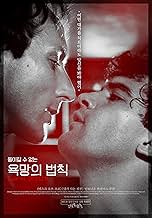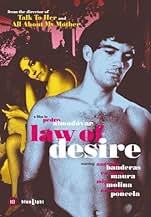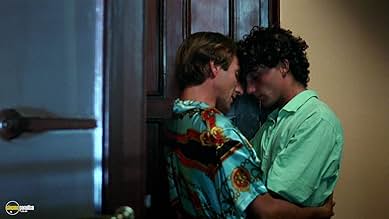A gay filmmaker becomes involved with an obsessive fan while still pining for his absent true love. Meanwhile, he shares a close but complex relationship with his trans sister, an actress.A gay filmmaker becomes involved with an obsessive fan while still pining for his absent true love. Meanwhile, he shares a close but complex relationship with his trans sister, an actress.A gay filmmaker becomes involved with an obsessive fan while still pining for his absent true love. Meanwhile, he shares a close but complex relationship with his trans sister, an actress.
- Awards
- 10 wins & 3 nominations total
Fernando Guillén
- Inspector de policía
- (as Fernando Guillen)
Nacho Martínez
- Doctor Martín
- (as Nacho Martinez)
Bibiana Fernández
- Ada - madre
- (as Bibi Andersen)
Rossy de Palma
- Locutora tele.
- (as Rosy Von Donna)
- Director
- Writer
- All cast & crew
- Production, box office & more at IMDbPro
Featured reviews
One of director Almodovars early films--and one of his best. A gay writer is basically stalked by a psychopath. The films manages to weave together comedy, drama and tragedy and make them all work! Also it manages to work in fairly explicit gay sex scenes and male nudity without it being exploitative--it just fits the storyline and characters. The movie takes a serious misstep about halfway through, throwing in a murder, but manages to regain its footing. The acting is pretty good--not great. Antonio Banderas is so-so as the psycho. I give him credit for engaging in gay sex scenes with no hesitation (I'd love to know what he thinks about this movie now!). The best thing about the movie is the direction--even when the story bogs down in spots, there's always something to look at on screen. Almodovar knows how to make films look beautiful and he, somehow, manages to have the settings fit the tone of the scene. How many directors can you say that about. An excellent film--well worth seeing. But if you're offended by explicit gay subject matter, stay away.
This is my second favourite Almodovar film, after "Hable con Ella". It reveals the depth of the characters' feelings with such subtlety and delicacy that as viewers we find ourselves unable to judge the characters' actions. We are puzzled by the intensity of their desire, love and misery in the same way that we are puzzled by Benigno's deep loneliness and longing for love in "Hable con Ella". In "La ley del Deseo," murder and suicide become extreme natural consequences of the characters' love and suffering. We cannot condemn the murder any more than we can condemn the rape in "Hable con Ella".
The most significant aspect of The Law of Desire is the fact that it was so accepted in Spain at the time of its release. It was put forward by the authorities as the movie to represent the country in 1987. Bearing in mind that Spain had only come out of a fascist dictatorship not much more than a decade earlier, this simple fact is a testament to how far the country had moved on in such a short period of time. The reason for this is that this is an unashamedly gay themed film, one that celebrates homosexuality and depicts it without issue.
The film itself is about a love triangle between three men. Like several other Pedro Almodóvar films it's a melodrama with thriller elements. It features an extremely daring performance by Antonio Banderas in a role where he is required to perform in some full-on gay love scenes. These moments made the film front page news in Spain but it did nothing to stop Banderas subsequent rise to stardom. For me, however, this is a middling movie. It's not amongst the director's best. In my view, its interest lies more in its historical significance as opposed to it's worth as a film.
The film itself is about a love triangle between three men. Like several other Pedro Almodóvar films it's a melodrama with thriller elements. It features an extremely daring performance by Antonio Banderas in a role where he is required to perform in some full-on gay love scenes. These moments made the film front page news in Spain but it did nothing to stop Banderas subsequent rise to stardom. For me, however, this is a middling movie. It's not amongst the director's best. In my view, its interest lies more in its historical significance as opposed to it's worth as a film.
I saw this film after having seen Bad Education, and there are many plot lines similar in both. I loved this film, not only am I a huge fan of Almodóvar, but in this film, the easy and simple beauty of the shots stood out. The acting was good, not amazing but good, particularly from Pablo and Tina. As well as directing beautifully, Almodóvar knows how to infuse a scene with sex, even if no sex is actually taking place-for example, when Antonio lights his cigarette of Pablo's. The film does become melodramatic towards the end, but I don't see this as a failing, melodrama, if done well, as it is here, need not be ridiculous
This film is centred on two siblings; Pablo, a gay film director who makes homo-erotic films; and his sister Tina, who is a transsexual lesbian who dreams of being an actress and is raising a ten year old girl named Ada who is the daughter of her former girlfriend. After Pablo's lover, Jaun, goes away for the summer he begins a relationship with Antonio, not suspecting that the latter will get dangerously jealous of his love for Juan.
As with most films by director Pedro Almodóvar the plot is secondary to the characters; it is there to put the characters in an interesting, and fairly melodramatic positions. This of course requires interesting central characters and here we get those. As is often the case they are a fairly unconventional group. There are things that may disturb some viewers such as Tina talking about her incestuous relationship with her father who persuaded her to get a sex change before leaving her... particularly shocking is that she doesn't feel abused. Pablo's relationships with Juan and Antonio are surprisingly frank for a film made in the eighties. The cast is solid with Eusebio Poncela and Carmen Maura really impressing as Pablo and Tina; Antonio Banderas is great as Antonio and young Manuela Velasco impresses as Ada. Things do get melodramatic towards the end but that doesn't feel out of place; in fact it is relatively mild compared to some of Almodóvar's other films. Overall I'd say this won't be for everybody but it is a must see for fans of Almodóvar's work.
These comments are based on watching the film in Spanish with English subtitles.
As with most films by director Pedro Almodóvar the plot is secondary to the characters; it is there to put the characters in an interesting, and fairly melodramatic positions. This of course requires interesting central characters and here we get those. As is often the case they are a fairly unconventional group. There are things that may disturb some viewers such as Tina talking about her incestuous relationship with her father who persuaded her to get a sex change before leaving her... particularly shocking is that she doesn't feel abused. Pablo's relationships with Juan and Antonio are surprisingly frank for a film made in the eighties. The cast is solid with Eusebio Poncela and Carmen Maura really impressing as Pablo and Tina; Antonio Banderas is great as Antonio and young Manuela Velasco impresses as Ada. Things do get melodramatic towards the end but that doesn't feel out of place; in fact it is relatively mild compared to some of Almodóvar's other films. Overall I'd say this won't be for everybody but it is a must see for fans of Almodóvar's work.
These comments are based on watching the film in Spanish with English subtitles.
Did you know
- TriviaThe iconic hose scene was shot twice. The first one wasn't useful because the pressure was so big that Carmen Maura fell down. While the crew adjusted the hose, Maura dried herself and changed the dress. The second time the scene was shot perfectly.
- Quotes
Pablo Quintero: It's not your fault if you don't love me and its not my fault if I love you.
- Crazy creditsPedro Almodóvar appears in a scene as an employee in a DIY shop and serves Banderas's character.
- ConnectionsFeatured in T'as de beaux yeux, chéri (2007)
- SoundtracksSymphony No. 10 in E minor, Op. 93
Composed by Dmitri Shostakovich (as D. Shostakovich)
Performed by Orquesta Sinfonica de la Flarmonicade Mosou
Conducted by Kirill Kondrashin (as Kirill Kondrachine)
- How long is Law of Desire?Powered by Alexa
Details
Box office
- Gross US & Canada
- $72,442
- Opening weekend US & Canada
- $13,399
- Aug 13, 2006
- Gross worldwide
- $100,566
- Runtime1 hour 42 minutes
- Sound mix
- Aspect ratio
- 1.66 : 1
Contribute to this page
Suggest an edit or add missing content




































